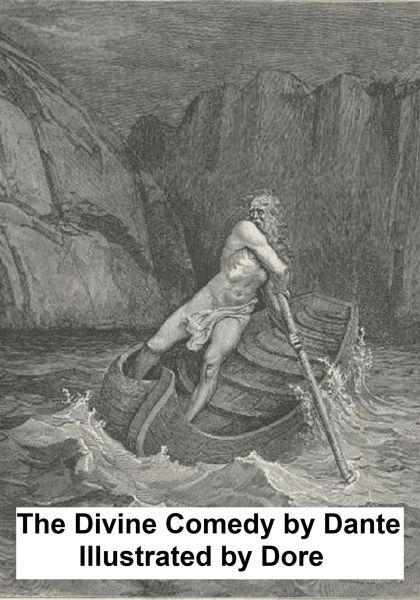The Divine Comedy
Illustrated by Gustave Dore. According to Wikipedia: "Durante degli Alighieri (c.1265 - 1321), commonly known as Dante Alighieri, was a Florentine poet of the Middle Ages. His central work, the Divina Commedia (originally called "Commedia" and later called "Divina" (divine) by Boccaccio hence "Divina Commedia"), is often considered the greatest literary work composed in the Italian language and a masterpiece of world literature." ... Paul" Gustave Doré (January 6, 1832 – January 23, 1883) was a French artist, printmaker, illustrator and sculptor. Doré worked primarily with wood engraving… At the age of fifteen Doré began his career working as a caricaturist for the French paper Le Journal pour rire, and subsequently went on to win commissions to depict scenes from books by Rabelais, Balzac, Milton and Dante... In the 1860s he illustrated a French edition of Cervantes's Don Quixote, and his depictions of the knight and his squire, Sancho Panza, have become so famous that they have influenced subsequent readers, artists, and stage and film directors' ideas of the physical "look" of the two characters. Doré also illustrated an oversized edition of Edgar Allan Poe's "The Raven", an endeavor that earned him 30,000 francs from publisher Harper & Brothers in 1883. Doré's illustrations for the English Bible (1866) were a great success, and in 1867 Doré had a major exhibition of his work in London. This exhibition led to the foundation of the Doré Gallery in Bond Street, London... Doré's later work included illustrations for new editions of Coleridge's Rime of the Ancient Mariner, Milton's Paradise Lost, Tennyson's The Idylls of the King, The Works of Thomas Hood, and The Divine Comedy. Doré's work also appeared in the weekly newspaper The Illustrated London News."
weniger anzeigen expand_lessVersandkostenfreie Lieferung! (eBook-Download)
Als Sofort-Download verfügbar
- Artikel-Nr.: SW9781455446391450914
- Artikelnummer SW9781455446391450914
-
Autor
Dante
- Mit H. F. Cary
- Verlag Seltzer Books
- Seitenzahl 280
- Veröffentlichung 01.03.2018
- ISBN 9781455446391
- Mit H. F. Cary

